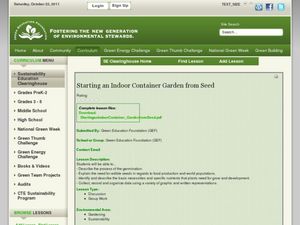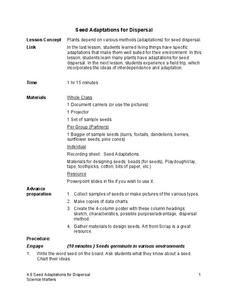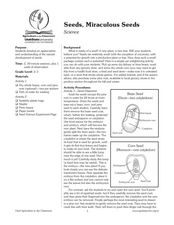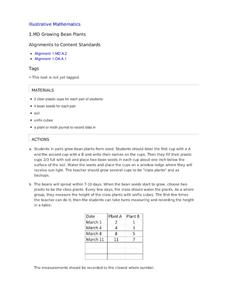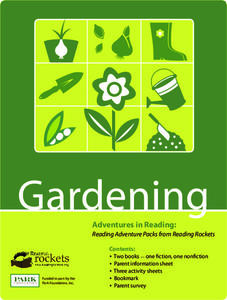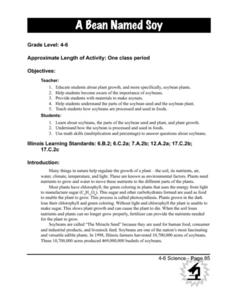Baylor College
Needs of Plants
What better way to learn about plant life than by creating a class garden? Young botanists start with a brief discussion about radishes before planting seeds and watching them grow. To determine the importance of water, sunlight, and...
Curated OER
Plants: Scattering Seeds
Middle schoolers collect and microscopically examine seeds from the school yard and neighborhood. In small groups, they draw and discuss the shapes of the seeds to determine each plant's method of dispersal. they also test two types of...
Howard Hughes Medical Institute
Seed Dispersal in Tropical Forests
How do seeds get around? It's not like plants can control seed dispersal—or can they? Dig deeper into the amazing mechanisms of seed dispersal observed in tropical plants through interactives, a video, and plenty of hands-on data...
Curated OER
Starting an Indoor Container Garden from Seed
Students create an indoor container garden. In this container garden lesson, students explore seed germination. Students discuss edible seeds.
Berkshire Museum
The Three Life-Giving Sisters: Plant Cultivation and Mohican Innovation
Children gain first-hand experience with Native American agriculture while investigating the life cycle of plants with this engaging experiment. Focusing on what the natives called the Three Sisters - corn, beans, and squash - young...
Curated OER
Plant Seeds
The concepts of a year, and the changing of the seasons are very important concepts to reinforce with young learners. Here, pre-kindergartners and kindergartners begin to understand the concept of one year, the passing of time, and the...
Education Outside
Seed Saving
After a discussion of the factors that affect seed germination, class groups harvest and preserve seeds from the school garden.
DocsTeach
Sequencing from Seeds to Harvest
Explore the farm to table experience in a fast-paced lesson on gardening. The activity uses image sequencing to help young scholars understand the process of growing food from seed to harvest. Academics also participate in group...
Baylor College
Do Plants Need Light?
Turn your classroom into a greenhouse with a lesson plan on plant growth. First, investigate the different parts of seeds, identifying the seed coat, cotyledon, and embryo. Then plant the seeds and watch them grow! Measure the new plants...
Science Matters
Seed Adaptations for Dispersal
After a grand conversation about seeds, adaptation, and dispersal, scholars work collaboratively to examine seeds and record their findings on a four-column chart. Small groups share their observations and further discuss seed...
Curated OER
Seeds, Miraculous Seed
Students investigate relationships between plants and animals and how living things change during their lives. In this life cycle lesson, students split different types of seeds apart to see the beginning life stages of future plants.
Illustrative Mathematics
Growing Bean Plants
Plant growth experiments offer rich, cross-curricular learning opportunities that can really excite and engage young learners. In this series, children work in pairs planting, measuring, and comparing the height of bean plants in order...
Agriculture in the Classroom
Seed Match
Using this resource, your team of green thumbs discuss why plants are a part of a healthy diet and the different ways they are used in daily life. They then observe the characteristics of different seed as they attempt to match them with...
Cornell University
Weed IPM
Go on a weed hunt! Scholars gain insight into the characteristics of plants and examine the outdoor environment in order to identify five different types of weeds. Learners then show what they know with a one-page reflection.
Curated OER
Seed Socks
Students explore how seeds travel. In this seed disbursement instructional activity, students head outside in their bare socks. Students walk around then before going inside they take the socks off and examine what their socks picked up....
Curated OER
Flowers and Plants
Students are assigned to bring five flowers. They explore flowers to distinguish different physical features of flowers. They compare and contrast different flowers to determine what features they have in common. Students develop an...
AtoZ Teacher Stuff
Pumpkin Life Cycle
From seed to jack-o-lantern, young scholars walk step-by-step through the life cycle of pumpkins with this fun art and science activity. After first participating in a shared reading of the children's book Pumpkin, Pumpkin children color...
PBS
Reading Adventure Pack: Gardening
A Reading Adventure Pack invites scholars to start gardening. Following a reading of two books—fiction and nonfiction—young green thumbs repurpose food containers to grow an herb garden in their kitchen, plant seeds in starter pots out...
Science Matters
Lotusland
It's time for a field trip! Scholars take their new-found knowledge of adaptations and seed dispersal on a field trip to a local botanical garden. They gain an up-close look at how ecological interdependence works in a distinct...
Curated OER
The Dirt on Plants
Students draw and label the four parts of a plant. They describe changes that are part of the common life cycle. Students follow various one and two step directions. They are asked to discuss that they can recall about plants.
Curated OER
How Does A Seed Become A Plant?
First graders evaluate what it takes for a seed to become a plant. They brainstorm what they know, discuss what they want to know and interact with a Plant WebQuest that indicates what they have learned. They also examine how we get the...
Curated OER
Life Cycle of Trees
Turn your students into young tree-tectives with this fun science investigation into the life of trees. To begin, a class volunteer gets dressed up in a tree costume as the different parts of trees are introduced. Then, the class learns...
Curated OER
Soybeans: The Miracle Seed
Students discover why soybeans are called the "miracle seeds." They make their own soynuts and share other foods made from soybeans. They create a bulletin board of soybean products.
Captain Planet Foundation
Square Foot Fall Garden
First graders learn the basic needs of plants and identify geometric shapes while planting a fall garden. Combining math and science in one lesson, the resource guides kids through starting their class garden as they discover the...





